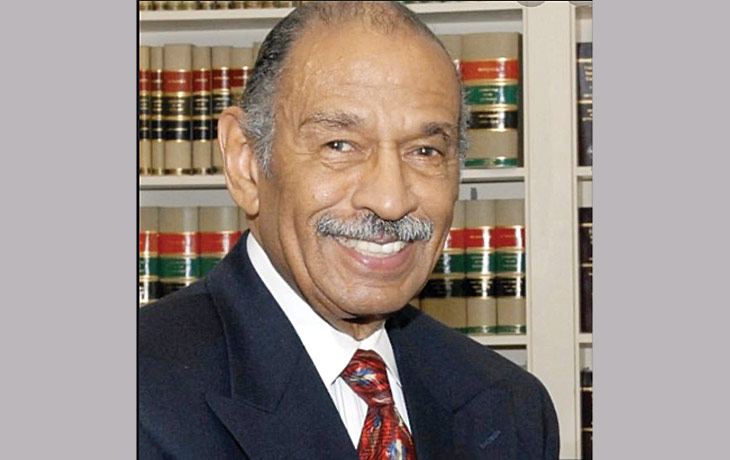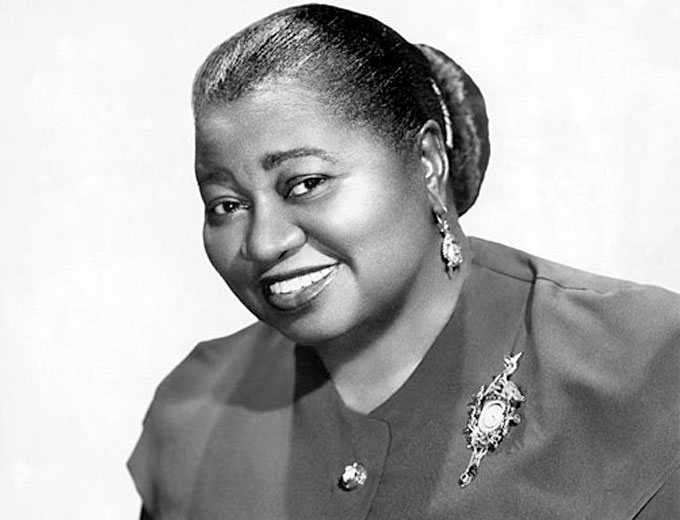1898—Hattie McDaniel, the first African-American to win an Oscar, is born. In this image provided by Turner Classic Movies, Vivien Leigh appears in character as Scarlett O’Hara, left, and Hattie McDaniel as Mammy, in the film, “Gone with the Wind.” (AP Photo/Turner Classic Movies)
June 8
1886—Homer A. Plessy, a light-complexioned Black man, refuses to leave the “White” section of a New Orleans railroad car and move to the “colored” section. His Rosa Parks type refusal sets in motion a legal case, which eventually reached the United States Supreme Court. In its May 1896 ruling, the Court decided against Plessy and thus confirmed the segregationist doctrine of “separate but equal.” The ruling also had the effect of treating anyone with any “Black blood” as Black. The court never actually ruled on Plessy’s claim that he was 7/8 White and only 1/8 Black and thus should not be treated as “colored” under the laws of that day.
1968—James Earl Ray, the man convicted of the assassination of Dr. Martin Luther King Jr., is captured at an airport in London using a false Canadian passport. Ray would spend the rest of his life trying to withdraw his guilty plea charging that his brother and a mysterious man he met in Montreal, Canada, named Raoul were actually involved in the killing of King. He claimed he “did not personally shoot Dr. King” but suggested he knew beforehand about the conspiracy to assassinate him. Ray died in prison in April 1998.
1982—One of the greatest athletes to ever play the game of baseball, Satchell Paige, dies in Kansas City, Mo. Paige had played in the old Negro Baseball Leagues and went unrecognized by Major League Baseball and the general public for decades. He was finally voted into the Baseball Hall of Fame in 1971.
June 9
1948—Oliver W. Hill becomes the first African American elected to the Richmond, Va., city council. He is best known for his work as a civil rights attorney helping bring down the segregationist doctrine of “separate but equal.” Hill was born in 1907.

1989—One of the “founding fathers” of the Congressional Black Caucus, Michigan Rep. John Conyers issues the first call for a Congressional investigation into paying African Americans reparations for the enslavement of their ancestors.
June 10
1760—Several sources list this at the birthday of Richard Allen—founder of the African Methodist Episcopal Church. Other sources give his birth date as Feb. 14, 1760. Regardless, the AME church was the first African-American organized and incorporated church in America. Allen, Absalom Jones and a group of free Blacks in Philadelphia founded the church in 1794. Allen and his group were initially members of the city’s predominantly White St. George’s Methodist Episcopal Church. But when several Blacks were ejected from the church for attempting to pray alongside Whites, Allen led a walkout, which resulted in the forming of the AME church.

1898—Hattie McDaniel, the first African-American to win an Oscar, is born on this day in Wichita, Kan. She won her Academy Award in 1940 for Best Supporting Actress for the role of Mammy in the classic film “Gone With The Wind.” Once criticized for playing stereotypical and sometimes demeaning “Black roles,” she responded, “I’d rather play a maid than be one.” McDaniel died in 1952.
1941—The “Black Moses,” Marcus Garvey dies in London, England. Starting around 1916, Garvey built his United Negro Improvement Association into the largest mass organization of Blacks in history, with the slogan “Up You Mighty Race.” The UNIA owned businesses ranging from bakeries to shipping companies. Garvey preached Black pride and self-reliance, while steering away from the more integrationist thrust of most prominent Black leaders of his day. He was eventually jailed on what are now viewed as trumped up mail fraud charges. Presidential intervention got Garvey freed. But in exchange for his early release from prison, the Jamaican native had to agree to leave the United States and not return. Separated from his U.S. base, Garvey was never able to rebuild the UNIA.
June 11
1963—President John F. Kennedy declares during a nationwide radio and television address that segregation was “morally wrong” and told the U.S. Congress it was “time to act” (pass legislation) to end all segregation of the races. That statement and similar ones endeared Kennedy to millions of African-Americans. However, a few months after making the declaration, Kennedy was assassinated in Dallas, Texas. But most of his legislative ideas would be implemented by his successor, President Lyndon B. Johnson.
1963—Displaying the tenacity of the segregationist mentality dominant in the South in the 1960s, Alabama Gov. George Wallace, with the aid of state troopers, stood in the doorway of the University of Alabama to block two Black students from integrating the school. But when the Deputy U.S. Attorney General returned later in the day with a force of National Guardsmen, Wallace stepped aside, and Vivian Malone and James Hood were allowed to register.
June 12
1840—The world’s first anti-slavery convention took place in London, England. The aim of the gathering was to unite abolitionists worldwide. However, the effectiveness of the convention was harmed by a decision to exclude female delegates.
1886—The Georgia Supreme Court upholds the will of former slave owner David Dickson who had left more than $300,000 to a child he fathered by raping a 12-year-old Black girl. The ruling made Amanda America Eubanks the wealthiest Black person in America. She would later marry one of her White first cousins.
1963—Medgar Evers, Mississippi field secretary for the NAACP, was assassinated in front of his home by White supremacist Byron de la Beckwith. All-White juries twice refused to find De la Beckwith guilty although the evidence was overwhelming. Finally, in 1995, Beckwith was convicted of killing the civil rights activist. Beckwith died in prison in 2001.
June 13

1967—President Lyndon B. Johnson nominates former NAACP Chief Counsel Thurgood Marshall to be the first Black justice on the United States Supreme Court. He said of his decision, it “was the right thing to do, the right time to do it.” Marshall had been a towering figure in the legal battles against segregation including lead counsel in the historic Brown v. Board of Education case. The Senate would confirm the nomination Aug. 30. An aside: Marshall’s original name was Thoroughgood but he shortened it to Thurgood.
June 14
1811—White anti-slavery activist Harriet Beecher Stowe is born. Stowe was the author of one of the best-selling books of 1852—“Uncle Tom’s Cabin.” The book addressed the brutality of slavery and featured the character of “Uncle Tom”—a slave who, perhaps unfairly, came to symbolize the accommodating Black person who showed complete deference to Whites. The book was such an indictment of slavery that when President Abraham Lincoln met Stowe he remarked, “You’re the little woman who wrote the book that started this great [civil] war.”

1970—Cheryl Adrienne Brown wins the Miss Iowa pageant and becomes the first African American to compete in the Miss America beauty pageant.

